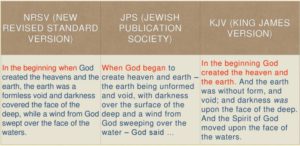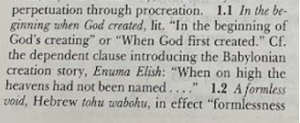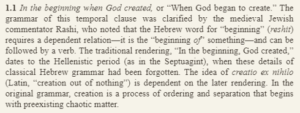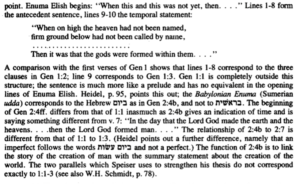 The standard translation takes Gen.1:1 to be an independent clause which refers to the absolute beginning of the universe: “In the beginning God created the heavens and the earth.” The word bərēʾšît (beginning) denotes the start of a whole sequence of events, that is, the absolute beginning of “the heavens and the earth.” The phrase is a rhetorical device (merism) which combines two extremes in order to refer to everything in between them. The translation is consistent with the idea that God created the whole universe ex nihilo.
The standard translation takes Gen.1:1 to be an independent clause which refers to the absolute beginning of the universe: “In the beginning God created the heavens and the earth.” The word bərēʾšît (beginning) denotes the start of a whole sequence of events, that is, the absolute beginning of “the heavens and the earth.” The phrase is a rhetorical device (merism) which combines two extremes in order to refer to everything in between them. The translation is consistent with the idea that God created the whole universe ex nihilo.
The NET Bible supports the traditional scholarship in its translators’ notes on Gen. 1:1 – “the translation assumes that the form translated “beginning” is in the absolute state rather than the construct (“in the beginning of,” or “when God created”). In other words, the clause in v. 1 is a main clause, v. 2 has three clauses that are descriptive and supply background information, and v. 3 begins the narrative sequence proper.”
This traditional interpretation has been dominant for centuries. However, it has recently been seriously challenged by scholars who are informed by historical criticism of the Pentateuch which began in the 19th century. For example, the JPS (Jewish Publication Society) and the NRSV argue that Gen. 1:1 is a dependent clause which follows parallels of ANE creation stories like the Enuma Elish. Accordingly, Gen. 1:1 is a temporal clause: “In the beginning when God created the heavens and the earth, the earth was a formless void.” When God began his work of creation in Gen. 1:3, there was already pre-existing matter which included the earth in a formless void (tohû and bōhû), darkness and the deep (təhôm); cf. the JPS translation makes this intepretation clearer). This suggests a relative beginning of ‘creation’ since there was pre-existing matter.
This raises the fundamental question whether God is the ultimate cause or principle of the universe. As Victor Hamilton queried, “Or does it affirm the existence of matter before the creation of the heavens and earth? To put the question differently, does Gen 1:1 suggest that in the beginning there was one—God; or does it suggest that in the beginning there were two—God and preexistent chaos?”[Hamilton, Genesis vol.1 NICOT (Eerdmans, 1990), p. 105]
A. Argument from comparative linguistics
This alternative translation is based on the premise that Genesis is influenced by the Babylonian creation story. The NRSV HarperCollins Study Bible [HCSB] (1993 print edition) produced by the premier academic institution, Society of Biblical Literature, justifies the translation by appealing to similar linguistic structure between Gen. 1:1 and the Enuma Elish (the comparative argument).
 Transcription: [1:1 In the beginning when God created, lit. “In the beginning of God’s creating” or “When God first created.” Cf. the dependent clause introducing the Babylonian creation story, Enuma Elish: “When on high the heavens had not been named…” 1.2 A formless void, Hebrew tohu wabohu, in effect “formless…].
Transcription: [1:1 In the beginning when God created, lit. “In the beginning of God’s creating” or “When God first created.” Cf. the dependent clause introducing the Babylonian creation story, Enuma Elish: “When on high the heavens had not been named…” 1.2 A formless void, Hebrew tohu wabohu, in effect “formless…].
Interestingly, the digital edition of the HCSB (2006) revised it’s rationale for translating Gen.1:1 as a dependent (circumstantial) clause:
 Transcription: [In the beginning when God created, or “When God began to create.” The grammar of this temporal clause was clarified by the medieval Jewish commentator Rashi, who noted that the Hebrew word for “beginning” (reshit) requires a dependent relation – it is the beginning of something – and can be followed by a verb. The traditional rendering, “In the beginning, God created,” dates to the Hellenistic period (as in the Septuagint), when these details of classical Hebrew grammar has been forgotten. The idea of creation ex nihilo (Latin, “creation out of nothing”) is dependent on the later rendering. In the original grammar, creation is a process of ordering and separation that begins with pre-existing chaotic matter]. End.
Transcription: [In the beginning when God created, or “When God began to create.” The grammar of this temporal clause was clarified by the medieval Jewish commentator Rashi, who noted that the Hebrew word for “beginning” (reshit) requires a dependent relation – it is the beginning of something – and can be followed by a verb. The traditional rendering, “In the beginning, God created,” dates to the Hellenistic period (as in the Septuagint), when these details of classical Hebrew grammar has been forgotten. The idea of creation ex nihilo (Latin, “creation out of nothing”) is dependent on the later rendering. In the original grammar, creation is a process of ordering and separation that begins with pre-existing chaotic matter]. End.
It seems that the NRSV (2006 digital edition) of the HCSB has abandoned the original NRSV (1993) argument that Gen.1:1 is a dependent clause, based on linguistic similarities between Genesis and Enuma Elish. Instead, the HCSB (2006) simply asserts that the traditional translation of Gen. 1:1 cannot be translated in the absolute state because “the traditional rendering, “In the beginning, God created,” dates from the Hellenistic period (as in the Septuagint),” and because these details are not consistent with classical Hebrew grammar. This assertion casts doubts on the competence of the translators of the Septuagint on grounds that they have forgotten details of classical Hebrew language (a debatable assumption) and that they allowed theological presuppositions to override linguistic evidence (another debatable assumption indeed!). In contrast to HCSB, the Masoretic scribes, whose competence in the Hebrew language is impeccable agree with the translators of the Septuagint.
Perhaps the editors of the HCSB (2006) moved away from the earlier argument that Gen.1:1 is a dependent, circumstantial clause based on alleged linguistic similarities between Genesis and Enuma Elish as the comparative argument could not ignore the challenge offered by prominent scholars like Alexader Heidel, The Babylonian Genesis 2e (1961), pp. 89-96 and Claus Westermann Continental Commentary on Genesis vol.1 (Fortress, 1990), pp. 96-97. Given below is Westermann’s reason for rejecting the suggestion of parallels between Genesis and the Babylonian Enuma Elish.
 Transcription: [Enuma Elish begins: “When this and this was not yet, then …” Lines 1-8 form the antecedent sentence, lines 9-10 the temporal statement:
Transcription: [Enuma Elish begins: “When this and this was not yet, then …” Lines 1-8 form the antecedent sentence, lines 9-10 the temporal statement:
“When on high the heaven had not been named,
firm ground below had not been called by name,
………………………………………..
Then it was that the gods were formed within them….”
A comparison with the first verse of Gen 1 shows that lines 1-8 correspond to the three clauses in Gen 1:2; line 9 corresponds to Gen 1:3. Gen 1:1 is completely outside this structure; the sentence is much more like a prelude and has no equivalent in the opening lines of Enuma Elish. Heidel, p. 95, points this out; the Babylonian Enuma (Sumerian udda) corresponds to the Hebrew ביום as in Gen 2:4b, and not to בראשׁית. The beginning of Gen 2:4ff. differs from that of 1:1 inasmuch as 2:4b gives an indication of time and is saying something different from v. 7: “In the day that the Lord God made the earth and the heavens… then the Lord God formed man …” The relationship of 2:4b to 2:7 is different from that of 1:1 to 1:3. (Heidel points out a further difference, namely that an imperfect follows the words עשׁות ׄביום and not a perfect.) The function of 2:4b is to link the story of the creation of man with the summary statement about the creation of the world. The two parallels which Speiser uses to strengthen his thesis do not correspond exactly to 1:1-3 (see also W.H. Schmidt, p. 78)]. End.
Bruce Waltke, author of An Introduction to Biblical Hebrew Syntax (Eisenbraun, 1990), in his 5-parts article on “The Creation Account in Genesis 1:1-3,” Biblioteca Sacra 1975 also questions grammatical arguments for translating Gen. 1:1 as a dependent clause., “the construction of 1:1-3 is not exactly the same as in Enuma elish. Whereas the Babylonian myths use enuma (or inuma) and the Sumerian myths at times start with udda to introduce the dependent clause, they correspond only to 2:4b but not to 1:1. None of them begins with the equivalent of the בראשׁית (“in the beginning”) of Genesis 1:1. In fact, Genesis 1:1 has no parallel in the ancient Near Eastern mythologies. Gunkel recognized long ago that “the cosmogonies of other people contain no word which would come close to the first word of the Bible.” Heidel concluded, therefore, that the comparative argument in favor of considering verse 1 of the Bible as a dependent clause is dubious.”
B. Argument from Hebrew grammar and syntax
Some scholars argue that the clause is dependent since the word berēʾšîṯ (preposition plus noun – “in the beginning”) does not have the article. But Westermann in his seminal commentary on Genesis rejects this argument. “בראשׁית: It has been maintained constantly that this phrase without the article cannot be translated “in the beginning,” but can only be treated as the first part of a construct chain…[but] the study of individual words must include a study of the vocabulary of the context…This is pointed out by Eichrodt [who] cites Prov. 8:23, “where mērōs is unequivocally determined by the preceding mēʿôlom…in addition: The article is quite often missing in such indeterminate indications of time.” [Westermann, Genesis. vol.1, p. 96]
Victor Hamilton elaborates: “the absence of the article is not a fatal argument against construing the word as absolute. For one thing, if as we have argued Isa. 46:10 [maggîd mērēʾšît ʾaḥărît – declaring the end from the beginning] shows rēʾšîṯ used in an absolute sense, it also provides us with an illustration of this word used both absolutely and indeterminately, and thus an exact parallel to Gen. 1:1. Second, all the ancient versions translate the word as an absolute and the whole verse as an independent clause. Third, the Masoretes understood the word to be absolute, for they accented the word with the disjunctive accent called a ṭipḥá, which is normal for words the absolute state, rather than with a conjunctive accent, which is normal for words in the construct state.” Hamilton adds, “all agree that Gen. 38:25 [which shares the same construction as Gen. 1:1 (preposition plus noun) has Tamar saying: “By the man [leʾîš] to whom these belong.” [Victor Hamilton, The Book of Genesis Chapter 1-17 NICOT (Eerdmans, 1990), p. 107]
E.J. Young’s linguistic argument against taking Gen. 1:1 as a construct is conclusive:
“In the Old Testament when a construct precedes a finite verb that fact is apparent either from the form of the word in construct or from the fact that the context demands that the word be taken as a construct. In Hosea 1:2, for example, we read תְּחִלַּ֥ת דִּבֶּר־יְהוָ֖ה [bərōʾttəḥillat dibber-yəhwâ]. Here the form of the word shows clearly that תְּחִלַּ֥ת must be a construct. On the other hand in a phrase such as that found in Exodus 6:28, וַיְהִ֗י בְּי֨וֹם דִּבֶּ֧ר [wayhî bəyôm dibber] the context demands that, although as far as the form is concerned it might be either absolute or construct, י֨וֹם [yôm] be taken in the construct state.
In Genesis 1:1 neither of these conditions is present. Neither the form of the word nor the context demands that בְּרֵאשִׁ֖ית [bərēʾšît] be taken as a construct. In fact, as we shall seek to point out, the context not only does not demand the construct but, if anything, favors the use of the absolute.” [E.J. Young, Studies in Genesis One (Presb. & Ref., 1964), p. 6.
The newer translation of v.1 as a dependent clause would be possible if the verb “create” were an infinitive construct (the usual form for circumstantial clause) rather than a perfect. However, the verb created in Genesis 1:1 is in the perfect, and the normal use of the perfect at the very beginning of a pericope is to denote an event that took place before the storyline gets under way. Waltke understands the verb, created [bārāʾ] is a telic verb which refers to the completed act of creation and adds, “A telic verb (i.e., die or sell) only finds meaning at the end of a process. The Hebrew term bārā’, meaning “to create,” only refers to a completed act of creation (cf. Deut. 4:32; Ps. 89:12; Isa. 40:26; Amos 4:13), so it cannot mean that, in the beginning, God began the process of creating the cosmos.” [Bruce Waltke, Genesis. A Commentary (Zondervan, 2001), p. 58]
Bruce Waltke gives his final judgment. “In sifting all the data, two facts emerge: (1) In both the Jewish and Christian tradition, the first word in the Bible was unanimously understood as being in the absolute state and the first verse was considered an independent clause. (2) Moses could not have used any other construction to denote the first word as in the absolute state, but he could have opted for a different construction to indicate clearly the construct state. It is therefore concluded that the text which has come down to us should be understood as an independent and not a dependent clause.”
We agree with Waltke that the classic translation is to be preferred, “In the beginning God created the heavens and the earth.”